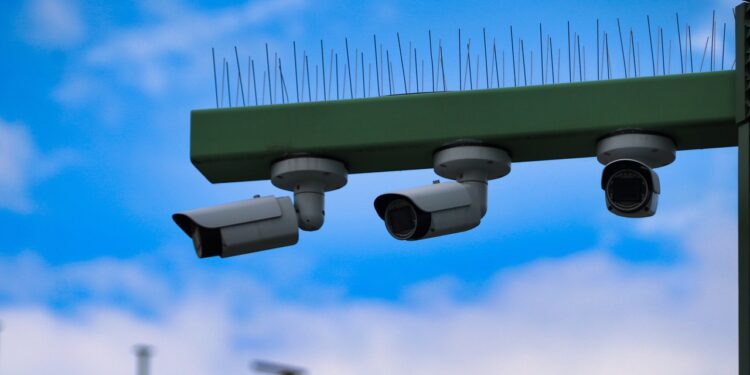Surveillance technologies have evolved so much over the last few decades, becoming a crucial tool for governments, corporations, and individuals. From security cameras on street corners to sophisticated facial recognition systems, data analytics, and online tracking, surveillance tools offer numerous benefits enhancing security, preventing crimes, and improving efficiency.
However, as these technologies permeate deeper into everyday life, they raise critical ethical concerns related to privacy, autonomy, consent, and potential misuse.
This article explores the ethical dimensions of surveillance technologies, addressing their benefits, the potential for abuse, and the moral dilemmas they pose in modern society.

Benefits of Surveillance Technologies
1.Security and Crime Prevention
One of the primary justifications for surveillance technologies is enhancing security. Public surveillance systems, such as CCTV cameras and facial recognition tools, are deployed to prevent crime, identify criminals, and maintain order in public spaces.
Governments and law enforcement agencies argue that these tools increase safety, deter criminal activity, and provide critical evidence for investigations. For example, in high-risk areas like airports and major cities, surveillance technologies are essential for monitoring suspicious behavior, tracking movements, and responding to threats in real-time.
2. Corporate Efficiency and Productivity
In corporate world, surveillance tools like employee monitoring software, keystroke loggers, and email tracking systems are used to ensure productivity and enforce company policies. These technologies help employers identify inefficiencies, detect potential security breaches, and ensure employees are focused on their tasks. The use of workplace surveillance has been rising, particularly in remote work environments where direct supervision is limited.
3. Public Health and Safety
During the COVID-19 pandemic, surveillance technologies played a pivotal role in contact tracing, monitoring population movements, and enforcing quarantine measures. Mobile apps that tracked individuals’ movements or notified them of exposure to infected persons were lauded as critical tools in controlling the spread of the virus.
Public health campaigns have also used surveillance to manage traffic in urban areas, monitor air quality, and provide real-time updates during natural disasters.
Ethical Concerns of Surveillance Technologies
Despite the advantages, surveillance technologies have generated significant ethical concerns. These issues largely center around privacy, consent, autonomy, and the potential for misuse.
1. Privacy Erosion
The most pressing ethical issue with surveillance is the erosion of privacy. As surveillance tools become more sophisticated, individuals’ private information movements, behaviors, and even biometric data can be collected and analyzed without their knowledge.
This constant monitoring risks transforming society into a “surveillance state” where privacy no longer exists. People might change their behavior, feeling as though they are constantly being watched, which can inhibit freedom of expression, personal development, and creativity.
The digital age has amplified this issue. Technologies like internet cookies, GPS tracking, and social media monitoring enable corporations and governments to track individuals’ online and offline activities extensively.
This can lead to “data surveillance,” where personal information is commodified and sold to third parties, often without informed consent.
2. Lack of Consent and Autonomy
Many surveillance technologies operate without explicit consent from the individuals being monitored. Public surveillance cameras do not typically require consent from passersby, and online data collection often happens through complex or opaque terms of service that most users do not fully understand.
This lack of transparency infringes on an individual’s autonomy and their right to control their personal data and make informed choices about how it is used.
Consent is further complicated by the fact that surveillance is often embedded in public spaces or digital platforms where individuals have little choice but to participate.
For instance, it’s nearly impossible to avoid being filmed in major cities, and opting out of data collection on social media platforms can result in losing access to essential features.
3. Surveillance and Discrimination
Another ethical concern involves the potential for discrimination and bias. Surveillance technologies, particularly AI-driven systems, can perpetuate existing biases in society. Facial recognition technology has been criticized for being less accurate in identifying individuals of color, women, and marginalized groups, which could lead to wrongful arrests or exclusion from services. Automated surveillance systems can reinforce stereotypes and inequalities if not carefully designed and monitored.
4. Potential for Government and Corporate Abuse
Surveillance tools can easily be misused by governments and corporations. In authoritarian regimes, surveillance is often employed to suppress dissent, monitor political opposition, and control citizens’ behavior.
For example, China’s extensive use of facial recognition and social credit systems to monitor its population raises serious concerns about the limits of state power and individual freedom.
Corporations, too, can exploit surveillance technologies to manipulate consumer behavior. Targeted advertising based on online surveillance is already a significant ethical issue, as it uses personal data to shape consumer choices and purchasing habits without their informed consent.
Striking an Ethical Balance
The challenge in regulating surveillance technologies is finding a balance between their benefits and the ethical concerns they raise. Here are some proposed solutions for achieving ethical surveillance practices:
1. Transparent Data Collection and Consent
Surveillance technologies should operate with clear, transparent policies about what data is being collected, how it is being used, and who has access to it. Informed consent should be sought wherever possible. For instance, websites should simplify terms of service agreements so users can make informed decisions about sharing their personal data.
2. Stronger Privacy Regulations
Governments must establish robust privacy laws to regulate the use of surveillance technologies and prevent abuses. In the European Union, the General Data Protection Regulation (GDPR) is a leading example of comprehensive privacy legislation that grants individuals greater control over their data. Similar regulations are needed in other parts of the world to ensure privacy rights are respected.
3. Ethical AI and Bias Reduction
Developers of AI-driven surveillance systems must actively work to reduce bias and ensure fairness. This requires using diverse training data sets, continually auditing algorithms for bias, and establishing ethical guidelines for AI development. Surveillance tools should not exacerbate existing social inequalities but should be designed to respect all individuals’ rights equally.
4. Independent Oversight and Accountability
To prevent misuse of surveillance technologies, independent oversight mechanisms are essential. Governments and corporations should be held accountable for how they deploy and use these technologies. Independent privacy commissions or ethical review boards could assess whether surveillance programs adhere to ethical principles and human rights standards.
5. Public Discourse and Advocacy
Finally, engaging the public in discussions about surveillance technologies is crucial for developing ethical guidelines. Citizens should be informed about the potential impacts of surveillance and encouraged to participate in shaping policies that protect their rights.
Conclusion
Surveillance technologies have undeniable benefits, from enhancing security to improving corporate efficiency and public health. However, they also raise significant ethical challenges, particularly regarding privacy, autonomy, and the potential for misuse.
As surveillance tools continue to evolve, it is critical to address these concerns through transparent policies, stronger privacy laws, and ethical AI development. By finding a balance between innovation and individual rights, society can harness the power of surveillance technologies while safeguarding fundamental ethical values.

















